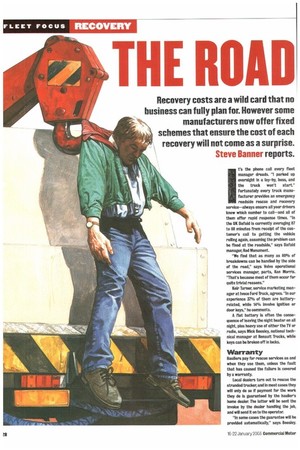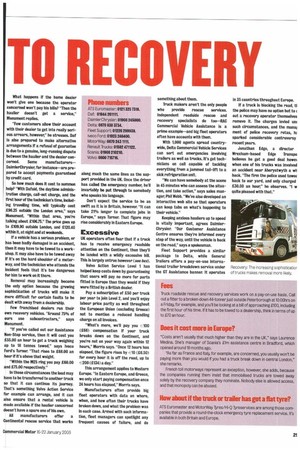E ROA TO RECOVERY
Page 28

Page 29

If you've noticed an error in this article please click here to report it so we can fix it.
Recovery costs are a wild card that no business can fully plan for. However some manufacturers now offer fixed schemes that ensure the cost of each recovery will not come as a surprise. Steve Banner reports.
t's the phone call every fleet manager dreads. "I parked up overnight In a lay-by, boss, and the truck won't start."
Fortunately every truck manu facturer provides an emergency roadside rescue and recovery service—always ensure all your drivers know which number to call—and all of them offer rapid response times. "In the UK Oaf aid is currently averaging 87 to 88 minutes from receipt of the customer's call to getting the vehicle rolling again, assuming the problem can be fixed at the roadside," says Dafaid manager, Rod Monument.
"We find that as many as 80% of breakdowns can be handled by the side of the road," says Volvo operational services manager, parts, Ken Morris. "That's because most of them occur for quite trivial reasons."
Keir Turner, service marketing manager at Iveco Ford Truck, agrees. In our experience 37% of them are batteryrelated, while 14% Involve Ignition or door keys," he comments.
A flat battery Is often the consequence of leaving the night heater on all night, plus heavy use of either the TV or radio, says Mick Beesley, national technical manager at Renault Trucks, while keys can be broken off in locks.
Warranty
Hauliers pay for rescue services as and when they use them, unless the fault that has caused the failure is covered by a warranty.
Local dealers turn out to rescue the stranded trucker, and in most cases they will only do so if payment for the work they do is guaranteed by the haulier's home dealer The latter will be sent the invoice by the dealer handling the job, and will send It on to the operator.
In some cases the guarantee will be provided automatically," says Beesley. What happens If the home dealer won't give one because the operator concerned won't pay his bills? "Then the haulier doesn't get a service," Monument replies.
"Few customers allow their account with their dealer to get into really serious arrears, however," he stresses. Daf is also prepared to make alternative arrangements if a refusal of guarantee is due to a genuine, long-running dispute between the haulier and the dealer concerned. Some manufacturersDaimlerChrysler, for Instance—are prepared to accept payments guaranteed by credit card.
So how much does it cost to summon help? "With Dafaid, the daytime administration charge, call-out charge, and the first hour of the technician's time, Including travelling time, will typically cost £96.25 outside the London area," says Monument. "Within that area, you're talking about £106.75." The price goes up to 1109.90 outside London, and 1120.40 within it, at night and at weekends.
If a vehicle has a serious problem, or has been badly damaged in an accident, then it may have to be towed to a workshop. It may also have tube towed away If It's on the hard shoulder of a motorway, and the technician who attends the Incident feels that it's too dangerous for him to work on It there.
Removal may increasingly become the only option because the growing sophistication of trucks will make it more difficult for certain faults to be dealt with away from a dealership.
Few franchised dealers run their own recovery vehicles. "Around 75% of ours use subcontractors," says Monument.
"If you've called out our Assistance Non-Stop service, then it will cost you £55.00 an hour to get a truck weighing up to 18 tonnes towed," says Ivaco Ford's Turner. "That rises to £68.00 an hour if it's above that weight.
'Within the M25 ring you pay £60.00 and £75.00 respectively."
In those circumstances the load may have to be transferred to another truck so that It can continue its journey. That's something Volvo Action Service for example can arrange, and It can also ensure that a rental vehicle is made available if the haulier concerned doesn't have a spare one of his own.
All manufacturers offer a Continental rescue service that works along much the same lines as the support provided in the UK. Once the driver has called the emergency number, he'll invariably be put through to somebody who speaks his language.
Don't expect the service to be as swift as it is in Britain, however. "It can take 21% longer to complete jobs In Europe," says Turner. That figure may rise considerably in Eastern Europe.
Excessive
UK operators often fear that if a truck has to receive emergency roadside attention on the Continent, then they'll be landed with a wildly excessive bill. This is largely untrue however (see box).
Volvo Action Service Level 1 has helped keep costs down by guaranteeing that users will pay no more for parts fitted in Europe than they would if they were fitted by a British dealer.
Pay a subscription of 150 per truck per year to join Level 2, and you'll enjoy labour price parity as well throughout the European Union (excluding Greece) not to mention a reduced handling charge on all invoices.
"What's more, we'll pay you 100 (£66) compensation if your truck breaks down on the Continent, and you're not on your way again within 12 hours," Morris says. "Once 12 hours has elapsed, the figure rises by ■-10 (£6.50) for every hour It is off the road, up to .A00 (£134) a day."
This arrangement applies to Western Europe. "In Eastern Europe, and Greece, we only start paying compensation once 24 hours has elapsed," Morris says.
Manufacturers often provide big fleet operators with data on where, when, and how often their trucks have broken down, and what the problem was In each case. Armed with such information, fleet managers can spotlight any frequent causes of failure, and do something about them.
Truck makers aren't the only people who provide rescue services. Independent roadside rescue and recovery specialists do too—RAC Commercial Vehicle Assistance is a prime example—and big fleet operators often have accounts with them.
With 1,000 agents spread countrywide, Delta Commercial Vehicle Services can sort out emergencies involving trailers as well as trucks. It's got technicians on call capable of tackling everything from a jammed tail-lift to a sick refrigeration unit.
"We can have somebody at the scene in 45 minutes who can assess the situation, and take action," says sales manager, Phil Webb. "We've also developed an interactive web site so that operators can keep tabs on what's happening to their vehicle."
Keeping anxious hauliers up to speed is vitally important, agrees DaimlerChrysler. Our Customer Assistance Centre ensures they're informed every step of the way, until the vehicle is back on the road," says a spokesman.
Fleet Support provides a similar package to Delta, while General Trailers offers a pay-on-use international trailer breakdown service under the CT Assistance banner. it operates in 35 countries throughout Europe.
If a truck is blocking the road, ti the police may have no option but to c out a recovery operator themselves remove it. The charges levied um such circumstances, and the manaj ment of police recovery rotas, hi sparked considerable controversy recent years.
Jonathan Edge, a director Wrexham-based Edge Transpo believes he got a good deal howel when one of his trucks was Involved an accident near Aberystwyth a wh back. "The firm the police used towei back to our yard, and only charged £30.00 an hour," he observes. "I w quite pleased with that."




























































































































































